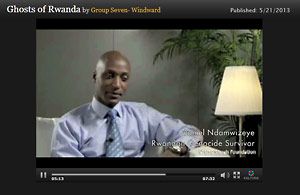High School Students Pilot New IWitness Activity

The activity asks students to create a video essay that answers the question, “Why Is It Important to Remember the Rwandan Genocide.” For this activity, the class of 41 students broke into eight groups and each group chose a topic for their essay. One group chose to do their essay on the need for education and awareness, another on the role of propaganda during the genocide and another group elected to look at the importance of remembrance as a lever to inspire future action.
Their final essays had to combine clips of testimony from the Visual History Archive, film footage, photography, as well as original footage that the students had to film themselves.
On Friday, May 31st, the students presented their essays to faculty and staff at Windward School and representatives from the USC Shoah Foundation. Attending the presentations from Windward School were Eryn Hoffman, Director of Global Programs, Peggy Procter, Director of Upper School, David Sainsilly, World Language Teacher, Grace Cruz, Associate Director of Upper School, and Tom Haglund, Dean of Science & Technology Outreach. Attending from USC Shoah Foundation were Kim Simon, Managing Director of the Institute, Karen Jungblut, Director Research and Documentation, Jenna Leventhal, IWitness Community Manager, and Edith Umugiraneza, Institute volunteer.
There was a lively question-and-answer session after each presentation where the students discussed such things as decision making process in developing their video essays, their understanding of the difference in the Rwandan context between war vs. genocide, their thoughts about the role and lack of international response to the genocide, and their realization of the lack of knowledge of the topic in their own community. A number of students expressed their insight and the belief that education could lead to future prevention of genocide.
“It was a wonderful opportunity to hear directly from the students themselves,” said Jenna Leventhal. “They were well prepared, conducted deep research, and were very articulate and clear about the reasons for the choices they made in developing their video essays. This group of students demonstrated the benefits of using IWitness to develop content knowledge, visual literacy, and critical thinking skills.”
What Can One Voice Tell Us About a Genocide will soon be available in IWitness so teachers will be able to incorporate the activity into their fall semester plans.